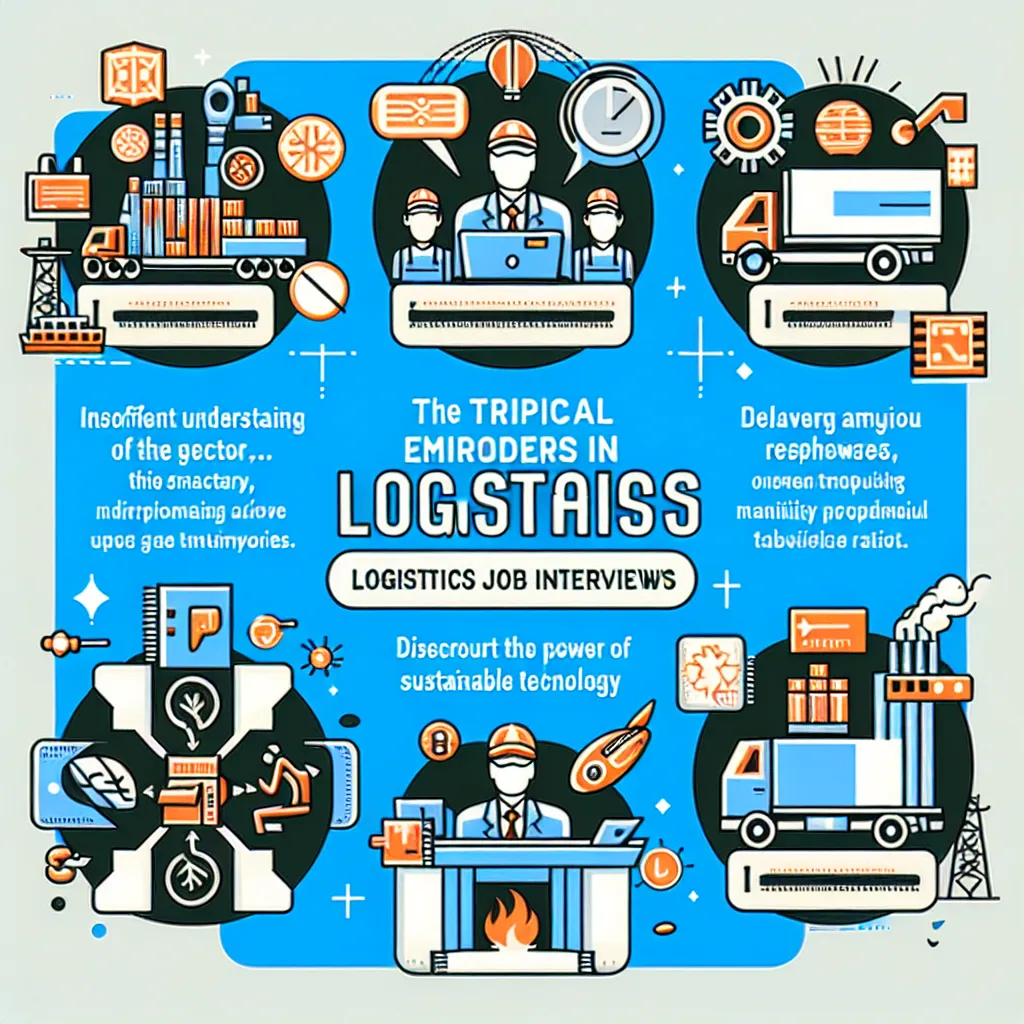Are you gearing up for a logistics interview? Whether you’re a seasoned professional or just starting your career in the field, proper preparation is key to success. This comprehensive guide will walk you through the essential steps to ace your logistics interview and land that dream job.
Understanding the Importance of Logistics Interview Preparation
Logistics is a critical component of any business operation, involving the management of the flow of goods, information, and resources from point of origin to point of consumption. As such, employers in this field are looking for candidates who not only understand the technicalities of logistics but can also demonstrate problem-solving skills, adaptability, and a strategic mindset.
The Multifaceted Nature of Logistics Roles
Logistics encompasses various roles, from supply chain managers to warehouse coordinators. Each position requires a unique set of skills and knowledge. Understanding the specific requirements of the role you’re interviewing for is crucial in tailoring your preparation.
 Logistics Interview Preparation
Logistics Interview Preparation
Key Areas to Focus on for Your Logistics Interview
1. Technical Knowledge
Interviewers will assess your understanding of logistics concepts, methodologies, and industry-specific software. Be prepared to discuss:
- Supply chain management principles
- Inventory management techniques
- Transportation modes and their pros and cons
- Warehouse management systems
- Logistics software (e.g., SAP, Oracle SCM)
2. Problem-Solving Skills
Logistics professionals often face complex challenges. Prepare examples that showcase your ability to:
- Optimize routes
- Reduce costs
- Improve efficiency
- Handle unexpected disruptions
3. Data Analysis
Data-driven decision-making is crucial in logistics. Be ready to discuss:
- Key performance indicators (KPIs) in logistics
- Experience with data analysis tools
- How you’ve used data to improve processes
4. Communication Skills
Effective communication is vital in coordinating logistics operations. Prepare to demonstrate:
- Clear and concise verbal communication
- Experience in writing reports and presentations
- Ability to communicate with diverse stakeholders
Common Logistics Interview Questions and How to Answer Them
1. “Can you describe a time when you had to solve a complex logistics problem?”
Answer: “In my previous role as a Supply Chain Analyst at XYZ Company, we faced a significant challenge when one of our main suppliers unexpectedly shut down. This disruption threatened to halt production at our manufacturing plant. I immediately led a team to identify alternative suppliers, negotiate terms, and restructure our delivery schedules. We also implemented a new risk assessment protocol to prevent similar issues in the future. As a result, we minimized downtime and maintained 95% of our production capacity during the transition.”
2. “How do you stay updated with the latest trends and technologies in logistics?”
Answer: “I’m committed to continuous learning in this ever-evolving field. I regularly attend industry conferences, such as the Annual CSCMP Conference, and participate in webinars hosted by logistics thought leaders. I’m also a member of the Council of Supply Chain Management Professionals, which provides access to cutting-edge research and networking opportunities. Additionally, I follow several logistics journals and blogs, including Logistics Management and Supply Chain Dive, to stay informed about emerging technologies and best practices.”
3. “How would you improve our company’s logistics efficiency?”
Answer: “To improve logistics efficiency, I would first conduct a comprehensive analysis of the current processes, identifying bottlenecks and inefficiencies. I’d then implement data-driven solutions, such as:
- Optimizing warehouse layouts to reduce picking times
- Implementing cross-docking to minimize storage costs
- Utilizing route optimization software to reduce transportation costs
- Introducing IoT devices for real-time tracking and improved visibility
- Implementing a robust inventory management system to reduce overstocking and stockouts
I’d also focus on employee training and fostering a culture of continuous improvement to ensure long-term efficiency gains.”
5. “How do you handle stress in high-pressure logistics situations?”
Answer: “In high-pressure situations, I rely on a combination of planning, prioritization, and clear communication. For example, during peak seasons, I create detailed contingency plans for various scenarios. When issues arise, I quickly assess the situation, prioritize tasks based on their impact on the overall operation, and delegate responsibilities to team members. I also ensure clear communication channels are established with all stakeholders to provide real-time updates. This approach helps maintain calm and focus, even in the most challenging situations.”
Tips for Handling Unexpected Questions
- Stay calm and take a moment to collect your thoughts.
- If you’re unsure about a question, ask for clarification.
- Use the STAR method (Situation, Task, Action, Result) to structure your responses.
- Be honest if you don’t know something, but explain how you would go about finding the answer.
- Relate the question back to your experience or theoretical knowledge when possible.
Common Mistakes to Avoid in Logistics Interviews
- Lack of industry knowledge: Not being up-to-date with current trends and technologies in logistics.
- Overemphasis on technical skills: Failing to highlight soft skills like communication and leadership.
- Vague answers: Not providing specific examples to support your claims.
- Neglecting the importance of sustainability: Failing to address environmental concerns in logistics planning.
- Underestimating the role of technology: Not showcasing your adaptability to new technologies in logistics.
To avoid these mistakes, thoroughly research the company and the specific role you’re applying for. Prepare concrete examples that demonstrate both your technical expertise and soft skills. Stay informed about industry trends, including sustainability initiatives and technological advancements in logistics.
 Common Mistakes in Logistics Interviews
Common Mistakes in Logistics Interviews
Follow-up Questions and Suggested Answers
-
Q: “How would you implement a new warehouse management system?”
A: “I would start by assessing our current needs and pain points. Then, I’d research suitable WMS solutions, involving key stakeholders in the selection process. After choosing a system, I’d create a detailed implementation plan, including staff training and a phased rollout to minimize disruptions. Post-implementation, I’d continuously monitor and optimize the system based on feedback and performance metrics.” -
Q: “What strategies would you use to reduce transportation costs?”
A: “To reduce transportation costs, I’d focus on several strategies:- Optimizing routes using advanced algorithms
- Consolidating shipments to maximize load efficiency
- Negotiating better rates with carriers
- Implementing a multi-modal transportation approach
- Using real-time tracking to improve delivery accuracy and reduce fuel waste
I’d also consider alternative fuel options and regularly review our transportation network design for long-term cost savings.”
-
Q: “How do you ensure compliance with international shipping regulations?”
A: “Ensuring compliance involves staying up-to-date with international regulations through regular training and subscriptions to regulatory updates. I’d implement a robust documentation system, conduct regular audits, and work closely with customs brokers. Additionally, I’d use compliance-checking software to automate parts of the process and reduce human error.” -
Q: “Can you explain the concept of reverse logistics and its importance?”
A: “Reverse logistics involves the movement of goods from customers back to sellers or manufacturers. It’s crucial for handling returns, recycling, and proper disposal of products. Effective reverse logistics can improve customer satisfaction, reduce waste, and recover value from returned products. I’ve implemented reverse logistics systems that have reduced costs by 15% and improved customer retention rates.” -
Q: “How would you improve inventory accuracy in a large distribution center?”
A: “To improve inventory accuracy, I’d implement:- Cycle counting procedures instead of annual physical counts
- RFID technology for real-time tracking
- Training programs to reduce human error
- Regular audits and root cause analysis of discrepancies
- Integration of inventory management software with other systems for better data synchronization
These measures have helped me achieve 99.9% inventory accuracy in previous roles.”
Conclusion
Preparing for a logistics interview requires a blend of technical knowledge, practical experience, and soft skills. By focusing on these key areas and practicing your responses to common questions, you’ll be well-equipped to impress your interviewers and land that logistics job you’re aiming for. Remember to stay calm, be specific in your answers, and showcase your passion for the field. Good luck with your interview!
For more tips on acing your job interviews, check out our article on how to talk about your experience in customer service, which can be particularly useful for logistics roles involving customer interactions.




